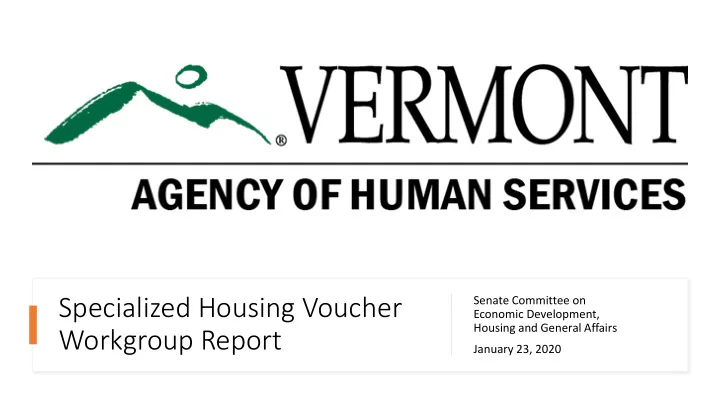

Specialized Housing Voucher Senate Committee on Economic Development, Housing and General Affairs Workgroup Report January 23, 2020
Statutory Charge H.542/Sec. E.300.4 SPECIALIZED HOUSING VOUCHERS “…requires the Secretary of Human Services to convene a workgroup to develop a strategy to fully utilize available federal rental assistance funds for vulnerable populations in Vermont” Specialized Subsidies Covered: • CoC- Permanent Supportive Housing “Shelter + Care” • CoC Rapid Rehousing (RRH) • Family Unification Program (FUP)
Working Group Members • Department of Mental Health • Department of Corrections • Department of Children and Families • Department of Disabilities, Aging and Independent Living • Housing and Community Development • Vermont State Housing • Vermont Housing and Conservation Board
Stakeholder In Input • Chittenden County Homeless Alliance (Continuum of Care, (CoC) • Vermont Council to End Homelessness (Balance of State CoC) • Vermont State Housing Authority Field Representatives • Burlington Housing Authority Leadership • ACCD/DHCD Housing Council • Vermont Affordable Housing Coalition • Provider Survey • Property Manager Survey
Findings and Recommendations
Report Finding: Market Forces Impact Utilization • External factors are impacting Vermont’s ability to utilize vouchers including: • rental market conditions (availability of affordable rental housing) • condition of the local affordable housing stock • the receipt of multiple new voucher allocations in the prior two years
Report Finding: AHS Leverages Funding for Services as Match for Federal Vouchers • Large agencies, like Designated Agencies and Specialized Service Agencies bill Medicaid for support services but are limited to serving people with mental health conditions • AHS funds roughly 40%-100% of housing case management support services in the smaller provider agencies the group studied • Most of these providers are using DOC, DCF, Housing Opportunity Program and DMH PATH funds to match with CoC subsidies • To a smaller extent providers use private funds, from University of Vermont Medical Center, their local United Way, and private donations
Findings Summary ry • Service funding is not tied directly to the CoC programs where services are required. The CoC has elected to utilize federal funding for subsidies not services to remain competitive. • AHS (via DCF) funds homeless services providers primarily for emergency shelter and homeless prevention services. • When providers are able, they leverage these dollars to serve people in CoC- administered programs like, Supportive Housing Shelter + Care and CoC Rapid Rehousing; however, there is not a designated funding source specifically for these interventions • Vermont’s network of affordable housing developers are serving formerly homeless individuals and families in their units, however, the affordable housing property managers surveyed report that services are not adequate to keep people stably housed
Recommendations • Based on work with the Statewide Council on Homelessness, the workgroup organized recommendations into four buckets thought to be “root causes” of underutilization: Services funding, Service design, delivery and coordination, Housing availability, Barriers to lease up and documentation
Recommendations: Services Service Funding • The increased availability of federal rapid re-housing assistance may warrant consideration of increased flexibility in the way the Vermont Rental Subsidy (VRS) is used to support housing stability of families receiving Reach-Up Service design, delivery and coordination , • Prioritize, coordinate and streamline funding exclusively for permanent supportive housing case management services so that providers can offer the level of services required by people eligible for RRH and CoC PSH S+C. Ensure housing-related services are focused on providing intensive. low- barrier, individualized, case management services for those ranked as “highest need” on the coordinated entry list used by CoC
Recommendations: Housing Availability Housing Availability • Continue to encourage Affordable Housing Providers to work with CoC’s to house people eligible for PSH CoC (S+C) to meet their “15%” goal. This would allow affordable housing providers to 1) increase the operating funding in their buildings through the subsidy portion and 2) ensure formerly homeless tenants have access to consistent, dedicated case management services.
Recommendations: Barriers to Lease-up and Documentation Barriers to Lease-Up • Advocate for changes at HUD at the Federal level to allow states and local communities more time to adapt to revisions it makes annually to CoC program prioritization and practice expectations. • Prevent vulnerable households from losing their federally subsidized housing and entering (or returning to) homelessness by ensuring eviction prevention activities are taking place in publicly funded affordable housing.
Alison Harte Director of Policy and Program Integration Agency of Human Services Alison.Harte@Vermont.gov
Recommend
More recommend